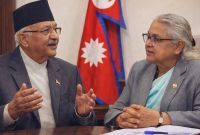Diplomatic Missteps: Gagan Thapa's Role in BRI Ambiguity and Ties with Chinese Embassy Questioned

Nepali Congress (NC) General Secretary Gagan Thapa is at the center of controversy due to his involvement in drafting Nepal’s Belt and Road Initiative (BRI) framework and his indirect ties with the Chinese Embassy in Kathmandu. These developments have sparked widespread criticism from both within his party and the broader political spectrum, raising questions about his leadership, priorities, and Nepal’s diplomatic direction in the face of regional geopolitical pressures.
The controversy began with Thapa’s participation in a high-level task force tasked with drafting the framework for Nepal’s involvement in China’s flagship BRI. This initiative was seen as an opportunity for Nepal to attract foreign investment for infrastructure development. However, the draft prepared under the task force, of which Thapa was a key member, has come under fire for its ambiguous language. The document, which was initially intended to frame Nepal’s participation strictly as grant-based, instead used the term "aid," a broader term that encompasses both grants and concessional loans. This lack of clarity has left Nepal vulnerable to the possibility of incurring significant debt, raising alarm bells among policymakers and international observers alike.
Critics within the Nepali Congress have pointed out that the ambiguity in the BRI framework contradicts the party’s earlier stance against accepting loans under the initiative. Senior NC leaders have voiced concerns about Thapa’s failure to secure a transparent and favorable agreement for Nepal. This dissatisfaction is compounded by the perception that Thapa’s handling of the matter has undermined the party’s unity and weakened its foreign policy positioning.
Thapa’s attempts to address these concerns with key international partners have also fallen flat. In discussions with Indian and American officials, he reportedly tried to justify the BRI agreement as donation-based, but his arguments failed to assuage their skepticism. Both India and the United States have long been cautious about China’s growing influence in Nepal, and the lack of clarity in the BRI draft has only heightened their concerns. Thapa’s inability to provide concrete assurances has been viewed as a diplomatic misstep, potentially straining Nepal’s relationships with these key allies.
Adding to the controversy is Thapa’s increasing engagement with the Chinese Embassy in Kathmandu, which has raised questions about his alignment with China’s interests. Sources close to the matter suggest that while Thapa may not be directly involved, his actions have indirectly facilitated the Chinese Embassy’s efforts to expand its influence in Nepal. A key point of contention is the Chinese Embassy Youth Pioneer Program (CNYP), an initiative designed to empower young Nepali leaders through leadership training, cultural exchanges, and professional development. Critics argue that the program, while ostensibly aimed at fostering bilateral relations, serves as a strategic tool for Beijing to shape Nepal’s political and social landscape.
The CNYP includes various components, such as leadership workshops, exchange visits to China, and networking events with Chinese diplomats and entrepreneurs. These activities are framed as opportunities for young Nepali leaders to gain exposure and develop their skills, but they have also drawn criticism for their potential to promote a pro-China agenda. The program’s emphasis on fostering "patriotic pioneers" and its close association with the Chinese Embassy have fueled suspicions about its underlying objectives. Thapa’s perceived role in enabling this program has further tarnished his image, with critics questioning whether his actions align with Nepal’s broader diplomatic and national interests.
Within the Nepali Congress, Thapa’s handling of the BRI framework and his proximity to Chinese-sponsored initiatives have deepened divisions. Senior leaders have expressed unease about his approach, viewing it as a departure from the party’s balanced foreign policy stance. The controversy has not only exposed internal rifts within the NC but has also cast a shadow over the party’s ability to navigate Nepal’s complex geopolitical landscape.
The broader implications of Thapa’s actions extend beyond the Nepali Congress. As Nepal finds itself at the crossroads of regional power dynamics, balancing its relationships with India, China, and the United States has become increasingly challenging. While China’s investments offer much-needed economic opportunities, they also carry the risks of debt dependency and erosion of sovereignty. Critics argue that Thapa’s actions, including his indirect engagement with Chinese-sponsored programs, could tilt Nepal’s foreign policy further towards Beijing, potentially alienating its traditional allies.
Thapa’s diplomatic missteps and growing association with the Chinese Embassy have placed him at the center of a political storm. The ambiguity in the BRI framework, coupled with his perceived support for initiatives like the CNYP, has raised serious concerns about the future direction of Nepal’s foreign relations. As the controversy continues to unfold, its repercussions are likely to have far-reaching consequences for Thapa’s political careerक and for Nepal’s position in the region. The need for greater transparency, accountability, and a balanced approach in Nepal’s foreign policy has never been more apparent.
Gagan Thapa



![From Kathmandu to the World: How Excel Students Are Winning Big [Admission Open]](https://nepalaaja.com/img/70194/medium/excel-college-info-eng-nep-2342.jpg)
